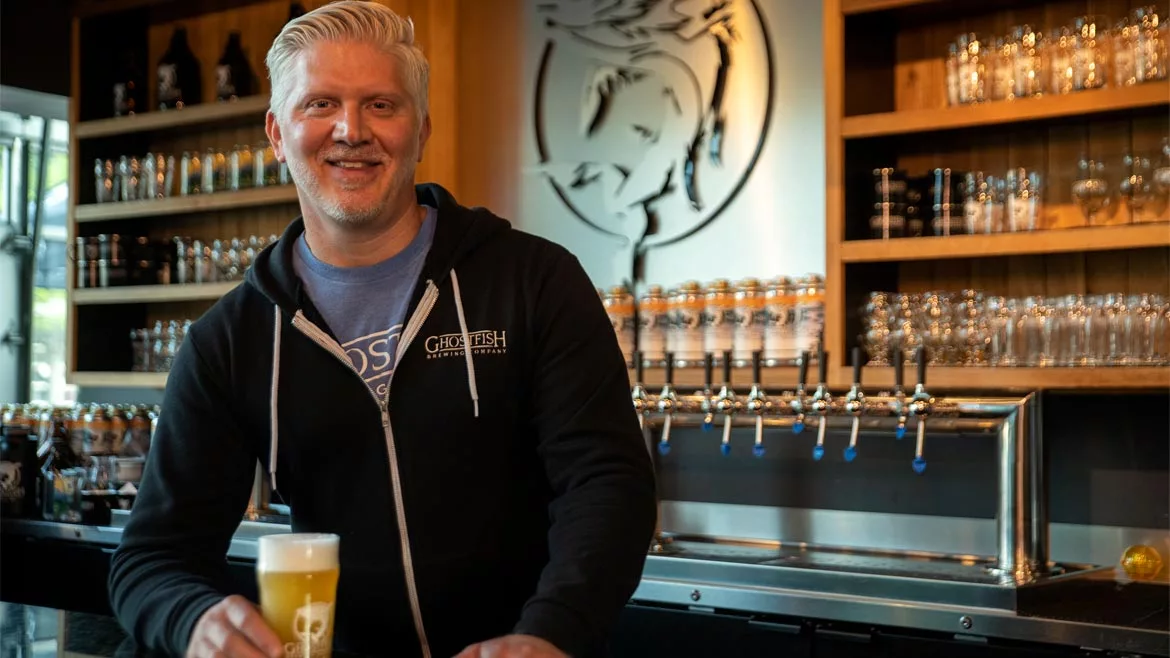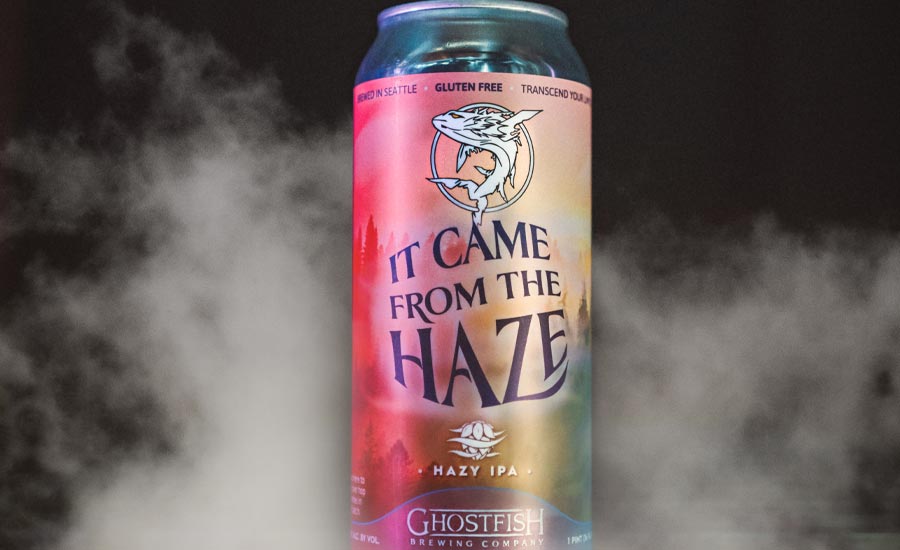Up Close With
Ghostfish Brewing delivers craft-forward taste in gluten free range
Seattle craft brewery brews traditionally using nontraditional grains

Image courtesy of Collin “Mac” MacIntosh
Buying a beer nowadays is a lot like buying a mattress. Something that is thought of as a simple task can quickly become overwhelming because of all the different options and suppliers.
That’s how Brian Thiel, co-owner, co-founder and managing member of Seattle-based Ghostfish Brewing Co., describes current consumer trends in the craft beer industry.
While it might seem like doom and gloom has set in for the craft sector, Thiel says he is an optimist. He sees plenty of aspects that attracted him to the industry in the first place, like innovation and unique brews.
“I’m still amazed that just when you think that every beer style has been created, everything has been played out, somebody comes out with something that’s new or a spinoff of something that was once old,” he says. “I’m also seeing some really awesome collaboration … This industry has always been very inclusive. If we need something here at Ghostfish, I can pick up the phone and any number of breweries would help us out.”
These types of bonds among breweries, as well as the “tremendous amount of passion” from brewers is what makes Thiel confident that the industry “is going to be just fine.”
In terms of consumer trends, Thiel notes that trends both positively and negatively impact the market’s performance. The biggest factor is that consumers are demanding options, and it goes back to the mattress analogy.
“Not that long ago, with buying a bed, there were many different mattress suppliers,” Thiel explains. “But today, you can really get overwhelmed trying to buy what’s thought of as a simple purchase such as a mattress. The same thing exists in this space.”
With non- and low-alcohol options and functional beverages gaining momentum, beverage options are ever-growing. Thiel notes that, among craft beers, it’s not what’s been done already, but what is going to be done for the consumer tomorrow.
When Ghostfish first started in 2015, the goal was to get out three packaged quality gluten free beers within the first few months of business, Thiel says. Even then, he recalls consumers asking when the next product would be arriving. However, he notes that consumers continue to seek out quality products.
“While there are probably more breweries shutting down today and other beverage companies going out of business, I think that’s normal supply and demand,” Thiel says. “It’s also based on consumers dictating what they deem what they want. And in most cases, what they feel like [wanting] is the highest-quality tiers. It’s kind of survival of the fittest thereafter.”

Tapping in to the gluten free sector
When he was younger, Thiel was influenced by his grandmother to collect beer cans. His collection, which is upwards of a thousand, has followed him from Ohio to Colorado to Washington. He went on to work in the aluminum can industry for more than 20 years.
“It’s ironic that I was once seeking out rare cans and I was working for companies that were making billions of printed aluminum cans,” Thiel says. “The hobby sort of wore off when I got to that point.”
Aside from his grandmother’s influence, Thiel recalls that his aunt used to own a carry out store. He and his brother were responsible for grabbing cases and packs of beer. He credits these early memories and hobbies as motivation for getting into the craft beer industry.
The concept of Ghostfish — which is a 100% gluten free brewery — began in 2011 or 2012, Thiel notes, and doors to the Seattle taproom eventually opened in February 2015. Prior to Ghostfish joining the gluten free brewery scene, options were few and far between.
“We wanted to create a product that we had never seen in the gluten free space,” Thiel says. “By that, I mean one that didn’t look like a medicinal product, one that was very craft-forward and one that appealed to the broadest range of beer drinkers, regardless of whether or not they were gluten free … We wanted a solid beer product that everyone could enjoy.”
Although it might seem like Ghostfish is unique because of its gluten free brews, Thiel says it’s a lot more than that.
“Sometimes, just hearing the word ‘gluten free’ can turn some minds off because either A.) They’re not gluten free, or B.) Because they’ve got a preconceived notion of what gluten free beer or gluten free food tastes like,” he explains. “What gets me excited when talking about Ghostfish is that, yes, we are a gluten free brewery. But we also brew with what some people refer to as ancient grains. I like to refer to them as nontraditional grains.”
These nontraditional or ancient grains have been used to brew beer, in some cases, long before the use of barley. Thiel points out that, in some areas of the world, it is still the preferred method.
“I like to describe what we do as traditional brewing using nontraditional grains,” he says. “That’s an exciting story in itself, with or without adding in [that we are] gluten free. All these grains grow naturally without the gluten protein, and therefore, allow us to make really awesome gluten free beer.”
When asked which products were the most popular, Thiel says it’s like choosing favorite children amongst a large family. Ghostfish’s Watchstander Stout was the first from the brewery, and often considered “the OG of gluten free beer” and has won two gold medals from the Great American Beer Festival in the gluten free beer category.
Ghostfish’s Grapefruit IPA also is extremely popular, Thiel notes.
“That’s hands-down our No. 1 selling beer in all markets we distribute to,” he says. “I have yet to find anybody that can dispute this claim, that is, I believe it to be the No. 1 selling craft dedicated gluten free beer sold in the United States.”
Additionally, the brewery’s Shrouded Summit Beligian White Ale is favored amongst consumers. It was one of the first beers brewed by Ghostfish, along with Watschstander, and has gone toe-to-toe in beer competitions against a well-known White Ale, which Thiel opted not to name.
“The other piece of this is that this is a beer that, traditionally, is brewed with wheat that contains gluten,” he says. “I really defy anybody to be able to tell that this beer is a gluten free beer. It tastes anything like a normal wheat beer style. It’s because of the quality of this beer.”
Thiel notes that Shrouded Summit also has given the brewery access to distributors in markets where it might not have otherwise been available.
“When we sent samples to our distributors, there’s been more than one time that they have singled out Shrouded Summit and said, ‘Wow, this beer, all your beers impressed us, but this one really blew us away,’” Thiel says.
The last variety that took off is the rotating IPA called It Came From The Haze.
“It may have felt like a fad, especially when the New England Style slash hazy IPAs hit the market years ago, but it’s still what I think every brewery has on their lineup, and it’s super popular for us, too,” Thiel notes.
During the month of May, which is Celiac Awareness Month, the company launched a social media campaign, partnering with Cappello’s, a producer of grain free and gluten free pasta, pizza and cookie dough; gfJules, a gluten free flour and baking mixes company; and The Greater Knead, a producer of gluten free bagels, chips and flour. The campaign featured partnered giveaways that allowed winners to receive Ghostfish beer and products from the partnered company.
“The idea behind the campaign is to call out the struggles with Celiac disease or the need to be gluten free and that you no longer have to go without or wish you could have something,” Thiel explains. “Additionally, to spread awareness ahead of the opening of our second production facility in Westfield, N.Y., to create demand in other places to make it easier for us to open up in new markets.”
Thiel notes that finding distributors that are “the right partner” is always a challenge.
“More brand awareness among consumers leads to conversations at the retail store, which eventually gets back to the distributor and starts their search on the Ghostfish brand,” he says.
Ghostfish also collaborated with the Fort Collins, Colo.-based Odell Brewing Co. to create a hazy IPA called Seduced By Fun, a project that was several years in the making. Thiel says collaborating with a highly-respected brewery like Odell fell in line with Ghostfish’s mission to “make high quality beer that appeals to everybody.”
“In this particular case, you’ve got fans of Odell who maybe never had a gluten free beer who got to have this beer and try what a gluten free beer was,” Thiel notes. “And fans on our side, who are gluten free, who maybe aren’t able to enjoy an Odell beer … are now able to enjoy a beer that has some DNA of Odell and Ghostfish behind it.”

Image courtesy of Collin “Mac” MacIntosh
Going forward with Ghostfish
The main focus for the brewery right now is to brew more beer to meet demand. Thiel expresses that things will continue coming down the Ghostfish pipeline.
“We’ve got some fun, limited, taproom-only beers that we’re going to do in 15 barrel batches, and we’ll see if any of those have some legs and potentially will become a brand that we’ll put some life into,” he explains.
With seven year-round beers, the brewery is looking into which to keep on the market and which would be better suited for potential seasonal production.
As of now, Ghostfish beers can be found in 18 states — soon to be 19 once agreements are finalized for distribution in Maine, Thiel says.
“We also have a distributor that we’ve worked with in other states that is getting ready to open up distribution in Ohio,” he adds. “I’m pretty excited about that, obviously. It’s home for me and there’s a lot of family and friends there.”
Ghostfish also can be found in three Canadian provinces: British Columbia, Alberta and Saskatchewan.
The company’s second production facility in Westfield, N.Y., recently brewed its first batch of Grapefruit IPA. Thiel reveals that, once that facility is up and going, it will sell beer to Ghostfish customers east of the Mississippi River, which will “bring some capacity back to the Seattle operation.”
In terms of what is next for the craft beer sector, Thiel says it’s hard to tell, especially because many companies are adjusting to operations post-pandemic. But the uncertainty doesn’t dwindle his enthusiasm.
The market is especially exciting in the United States because there are so many craft breweries, even in rural areas, which Thiel finds to be special.
“The rest of the world is still embracing and, it appears, wanting more craft beer,” he adds.
Thiel also points out that craft beer is popular in other areas of the world, such as South America and Asia.
“As far as Ghostfish is concerned, Ghostfish is and will continue to be an important brewery in the fabric of the craft industry tapestry,” he says. “I expect that we’re going to continue to be a leader and the preferred gluten free beer amongst consumers in a gluten free beer space.”
Looking for a reprint of this article?
From high-res PDFs to custom plaques, order your copy today!






